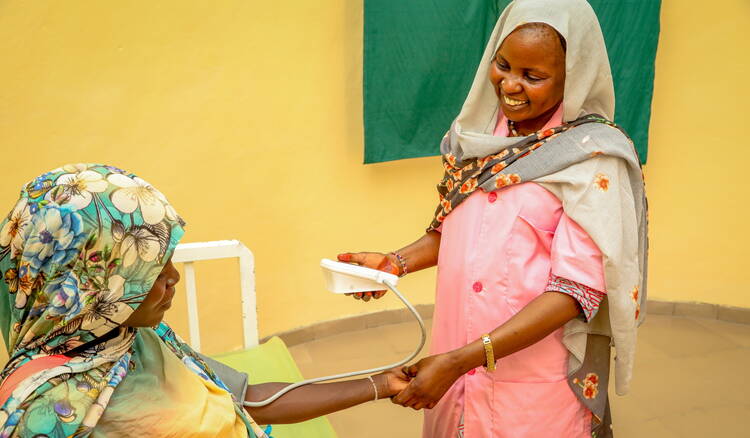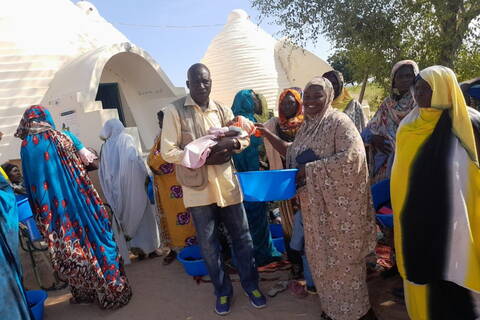Trust as a prerequisite for safe births
With competence and passion: Midwife Zara Daoud from the Rimélé Birth House in Chad gives us insight into her daily work.
"So much has changed for the better," says midwife Zara Daoud with delight. "Today, women really do come to the birth house." Nevertheless, in Chad, very few women still give birth with adequate medical support. The result is a maternal mortality rate that is about 140 times higher than that in Switzerland. With various measures, Women's Hope aims to make pregnancy and childbirth sustainably safer for women in the Ouaddaï region of Chad, such as through the construction of birth houses or the promotion of midwives.
High Barriers to Access
The reasons why women often do not seek medical institutions are diverse: Many women simply live too far away from the relevant services. Existing health centers are often poorly equipped, and the population has little trust in the available institutions. Finally, political instability and sporadic disease outbreaks make access to adequate healthcare difficult.Amidst these challenges stands Zara Daoud, 34, who works as the only midwife in the local birth house in Rimélé – a town with around 11,000 inhabitants in the eastern part of the country. Our partner organization BASE built the birth house together with the local population. The active involvement of the population in the construction of the birth house has significantly contributed to their trust in and use of the facility.

In good hands: a pregnant woman is examined by Zara Daoud
Zara Daoud reports that some women need an entire day to reach the birth house. Some women come with their donkeys, others on foot. Despite the sometimes challenging journeys, Daoud observes that many women visit the birth house more frequently – even for less serious issues such as headaches during pregnancy. This change represents a significant advancement for Daoud and demonstrates the strong integration of her work into the community.
"Before the new maternity ward was built, it was very cramped in the health center where we worked. Today, the women feel comfortable when they come here."
Extensive Work
"Before the new maternity ward was built, it was very cramped in the health center where we worked. Today, the women feel comfortable when they come here," Daoud says happily. In the birth house, so-called matrons – experienced birth attendants – occasionally assist the midwife. Together, they care for about ten to fifteen women daily. In case of complications, the women are transported to the hospital via a moto-ambulance; depending on the weather, the journey takes about two hours. The moto-ambulance, a motorcycle upgraded to an ambulance, can also cross swollen rivers during the rainy season. Since there are no paved roads around Rimélé, this light vehicle is the optimal solution for emergency transport. However, the moto-ambulance is not only used in emergencies but also to bring women from the surrounding areas to the birth house.
Zara Daoud's work goes far beyond assisting with births: the young midwife conducts family planning discussions and actively visits various villages to administer vaccinations, raise awareness about safe births, and identify and support malnourished children. Zara Daoud is pleased with the improved mother-child care in her homeland. However, she aims to achieve further improvements, especially concerning child care. In Rimélé, this dedicated woman is at the forefront of driving these advancements forward.
Cover picture: Workplace of midwife Zara Daoud: Rimélé Birth House, Chad; Photo: Salomon Djekorgee Dainyoo/WHI/Fairpicture
Our project work in Chad
CHAD: THE COMMUNITIES SET THE COURSE
Women in the Abougoudam health district have access to reproductive health services and are empowered to demand them.


